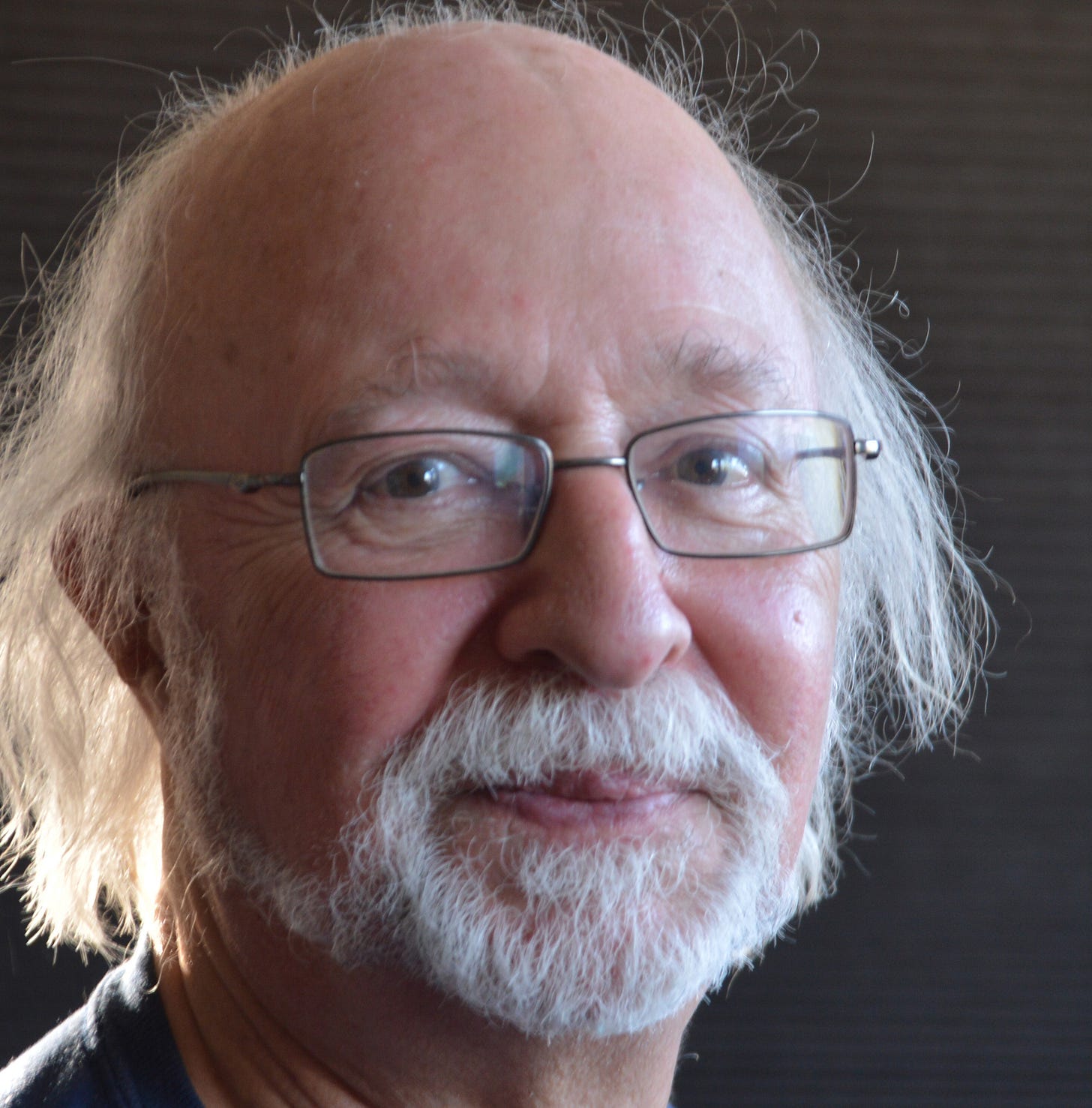Interview with Steven Forrest
EA Interview series, part 2
Biography
Steven Forrest is the author of several astrological bestsellers including, The Inner Sky. His work has been translated widely and he has traveled world-wide teaching his brand of choice-centered evolutionary astrology – an astrology which integrates free will, grounded humanistic psychology and ancient metaphysics. He won the 2018 Regulus Award for Education. Between 1998 and 2019, over two thousand people passed through his Astrological Apprenticeship program. In 2020, he opened his online school, The Forrest Center for Evolutionary Astrology. To keep himself honest, he still does several private consultations each week.
Interview questions and answers
Tell us a little bit about your background and how you became a professional astrologer. I know from your website that you got into it through astronomy, but that’s about it! Who were your early influences? How did you gain such a profound understanding of the astrological archetypes as demonstrated in your very first book The Inner Sky (which still holds one of the best descriptions of the signs, in my opinion)?
You’re right about how astronomy was the doorway for me. Ever since I was little, I was fascinated by the heavens. I spent many hours looking through telescopes. My social conditioning was 1950s working class streets-of-New-York stuff, so astrology was basically unknown territory apart from a bit of Sun sign stuff. When I looked through the eyepiece of a telescope, I was thinking about atoms and molecules, but something was sinking in at a deeper level. It took me many years to articulate it, but basically I began to realize that the sky was alive – that when I gazed at the heart of a galaxy, I was looking into the eyes of a living entity. Again, it took me years of deconditioning to see the world that way, but the core perception was so powerful that it began to subvert the materialistic views I had been raised with. That’s really what laid the foundation for my devotion to astrology.
At a more concrete level, when I was about 13, I met a woman from Germany who taught me the rudiments of palmistry – and that’s a subject I still take seriously. But the point is that the intellectual organization of palmistry is the same as that of astrology – on your palm, there’s a plain of Venus, a plain of Mars, and so on. So my mind began to organize itself around those archetypal patterns when I was very young.
The final trigger was actually a late-life tonsillectomy. I was 17 and my tonsils had to go. I was in recovery for a couple of weeks. My mom offered to buy me a book to pass the time when I was in bed. I asked for an astrology book. That surprised her a bit, but she was OK about it. She got me a really junkie one, but even in those sorry pages, I could tell something was going on. I asked for another one and she brought my Joseph Goodavages’ Write Your One Horoscope. That’s what really got me going. I dived into reading everything I could get my hands on about the field, and I never stopped until I was ready to write my own first book.
Early influences? The British theosophist astrologers mostly – Ronald C. Davison, Charles E.O. Carter. Noel Tyl became important to me by the time I was in my early 20s. Probably the single most influential book I ever read was The Theory of Celestial Influence by Rodney Collin. I guess I’d call it “meta-astrology,” but it really impacted my thinking – it still does to this day.
Later in your career, you teamed up with Jeffrey Wolf Green and the two of you became known as “the Pluto brothers”, pioneers of the evolving field of evolutionary astrology. In your opinion, is there anyone – you, Jeffrey, or others – who can be considered as a founder of evolutionary astrology? Furthermore, why were you really called Pluto brothers? We know that Pluto plays a very special role in Jeffrey’s method, but not so in yours – am I right?
Those were some beautiful days, Kim. Jeff’s approach and my own were and are quite distinct at the technical level, but we were basically peas-in-a-pod philosophically. We both looked at the birthchart through the lens of the evolution of consciousness and we both used the language of reincarnation. Not too many people did, back in those days.
I actually barely knew Jeff’s work and he barely knew mine, but then the hand of the universe struck – there was a crisis. A well-known astrologer whom we both knew was accused of some grievous sexual misconduct. Jeff and I were asked to intervene in what could have an explosive embarrassment for our field. It was a tough, complicated situation. I liked who Jeff was under fire. I guess he liked me too. We started talking about doing a seminar together. That grew into three of them, and out of those three events sprung Measuring The Night, volumes 1 and 2.
We’ve both got Scorpio Rising and we both act that way, which is, I suppose, why people started calling us “The Pluto Brothers.” It stuck, and that was fine with me.
We each had large followings even back then, but our readers and students were mostly different people. Stylistically, Jeff and I are very different too, and that probably accounted for why we drew such separate crowds. When his audience found me and vice versa, evolutionary astrology hit something like critical mass. It just took off after that. Unfortunately it wasn’t long before Jeff’s health issues caught up with him. I was left as the only one standing, which deflected way too much of the “inventor” limelight to me. Just a couple weeks ago, I was giving a keynote at the NORWAC conference in Seattle and I was introduced as the creator of evolutionary astrology. I am not, and I’ve never claimed that.
Just to set the record straight, the first person that I know of to coin the term “evolutionary astrology” was neither Jeff nor me – it was Ray Merriman, back in the 1970s. He did a book by that title that had to do with astrology and reincarnation. Some small-minded people have leveled the accusation at me that I “stole” evolutionary astrology from Jeff. The facts would better support the idea that we both stole it from Ray.
Not to be petty about this, but here's an easily verifiable fact – I used the term “evolutionary astrology” in my first book, The Inner Sky, which came out in 1984. Jeff used it in his own first book, which came out a year later.
The deeper reality by far is that the whole idea of linking astrology to reincarnation and modern psychology was bubbling up from the collective unconscious all through the 1960s and 1970s. The idea that any single person “invented” it seems completely crazy to me. You find bits of it in Dane Rudhyar. You can find a lot of it in Martin Shulman. There’s tons of it in those Theosophical astrologers I mentioned earlier.
You and Jeffrey defined a number of core perceptions of what evolutionary astrology is which are still visible on your website. Looking back at these seven points today, do you feel that they have stood the test of time? Is there anything you would like to modify, add, or take away?
I’d still basically stand by them, although I’d probably soften the language a bit here and there. They’re the core philosophical cornerstones of the system.
Jeff and I did diverge quite a lot about Pluto’s role. I never think of it as the Soul. I’d prefer the term the Wound – and how we deal with it. And technically, the “Pluto School” approach is very different from what I teach. I never want to make anybody wrong unless they’re hurting somebody, and I think many forms of astrology can be helpful. But for what it’s worth, I use Placidus houses, not Porphyry. I use the Mean lunar nodes, not the so-called True ones. I don’t use polarity points. The point is that Jeff and I developed along very different lines technically, but we came from the same core foundation of metaphysical principles. The seven points you mention are basically where we converged.
One of the most difficult things in chart interpretation is chart synthesis – taking all the different planets, asteroids, angles, aspects etc. and interpreting them as a whole. Jeffrey Green’s method was quite simple in this regard: Pluto is the root of the chart, and everything else is interpreted in the light of that. Other astrologers use a whole range of methods, some more technical than others. How do you work with chart synthesis?
That’s a huge subject, in reality too big for an interview. As I mentioned, I definitely do not start with Pluto. As a quick overview, I look at the Moon’s south node, its ruler, and their aspects to get a sense of what karma has compelled this soul to return to embodiment for further work. I look to the north node for clues about how to move forward on the path with the least pain and the greatest efficiency. Once I understand all that, I turn to the Sun, Moon, and Ascendant, then to the planets, looking at them as the vehicle the soul has chosen to use for that deeper work that the nodes reveal.
What are some developments you are seeing or would like to see in the field of evolutionary astrology - whether in your own astrology school or more broadly? Personally, I think it is very interesting with authors who try to use EA in a more evidence-based way in support of reincarnation research, including my own teacher Michael De Baker in his latest volume Same Soul: The Astrology of Sequential Reincarnation.1
Like you, I am really excited about the convergence of EA-style reincarnational analysis and what we can learn about the same subject through other disciplines, such as the hypnotic regressions pioneered by Roger Woolger and Patricia Walsh. Whenever two independent vectors of research come to the same conclusions, there’s something illuminating and convincing about that. We need more of that kind of work. Personally, I am very ignorant about the astrology of physical health. I’d like to see more work done in that area, integrating evolutionary approaches to health issues and concerns.
Lastly, do you have any idea what became of Jeffrey Green after his retirement around 2005? As of June 2023, the guy doesn’t even have a Wikipedia entry which seems like a shame for someone who had the kind of influence that he had (and a bit strange as well; I think he did have a Wikipedia article a few years ago, but it seems to have been removed).
The last time I saw Jeff was 2005. We had a couple of email interactions, perhaps as late as 2007. Then he disappeared. I know he had had some serious health issues – his body was damaged by chemical exposure when he was a Marine during the Vietnam war. There were rumors and stories of some legal problems too, but I’m not sure where the truth lies with all of that. He certainly did go underground in a big way. I honestly don’t know where he is today or what was behind his disappearance. The world of astrology is poorer for his absence.
As of September 2023, Michael recently released the second book in the series: Same Soul, Volume 2. Both volumes focus on a number of strong cases for reincarnation and how those cases are supported astrologically, albeit with slightly different approaches.



